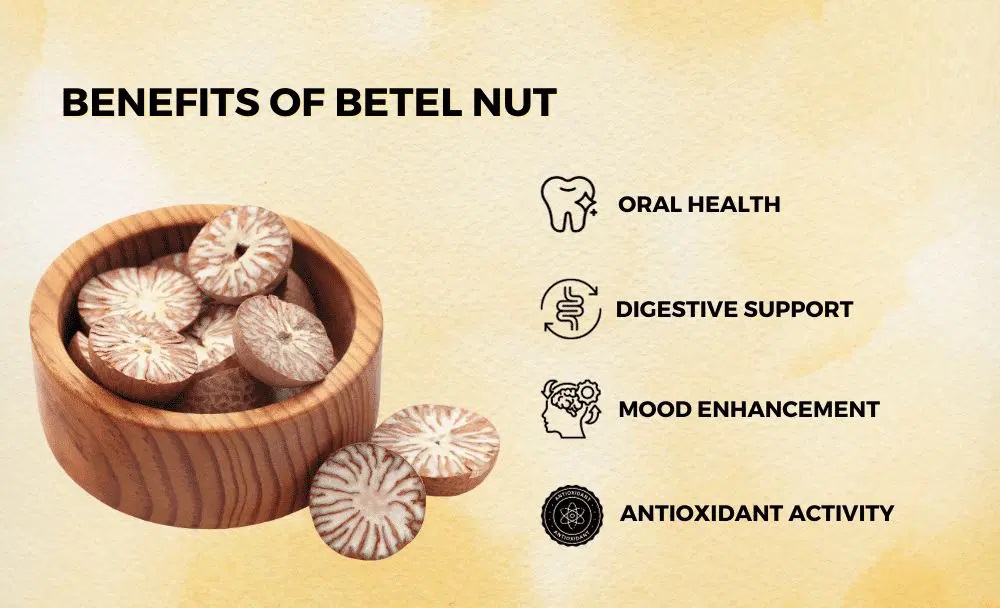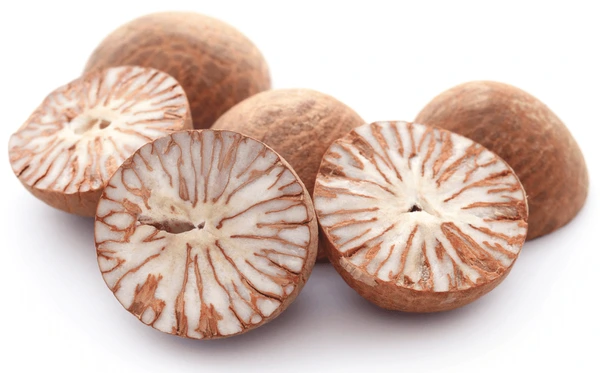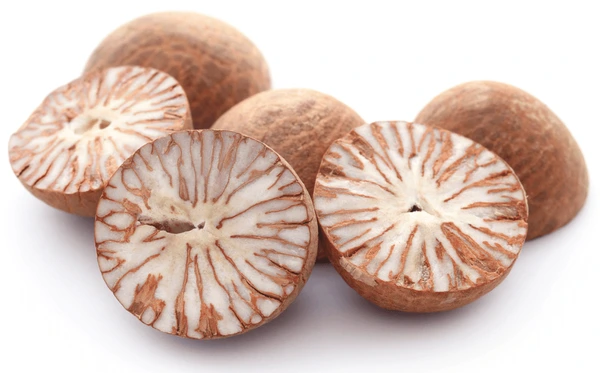What is Betel Nut?
The areca tree is a feathery palm that grows to approximately 1.5 m in height and is widely cultivated in tropical India, Bangladesh, Japan, Sri Lanka, south China, the East Indies, the Philippines, and parts of Africa. The tropical palm trees bear fruit all year. The nut may be used fresh, dried, or cured by boiling, baking, or roasting. The quid is a mixture of areca nut, tobacco, and lime wrapped in the leaf of the betel vine (Piper betel L. Family: Piperaceae).

Scientific Name(s)
Areca catechu L. Family: Palmaceae (palms)
Common Name(s)
Areca nut, paan, paan-gutkha pinlang, pinang, and supari.
Medical Uses
Betelnut (areca nut) has been traditionally used in various medical contexts, though modern medicine largely cautions against its use due to significant health risks. In some cultures, it has been employed as a digestive aid, believed to stimulate saliva production and enhance the breakdown of food. Additionally, betelnut has been used for its antiparasitic properties, especially in the treatment of intestinal worms. It has also been applied as a mild stimulant to increase alertness. However, the long-term consumption of betelnut is associated with serious health issues, including oral cancer, and its medical benefits remain controversial in modern practice.
Forms
Betelnut (areca nut) comes in various forms depending on how it is prepared for consumption or use. Here are the common forms:
- Whole nut
- Sliced or chipped
- Powdered form
- Betel quid (paan)
- Flavored or sweetened form
- Processed betelnut in tablets or supplements
Each form varies in terms of preparation, taste, and impact on health, with additives often increasing the associated risks.
Health Benefits
Betelnut (areca nut) has been used in traditional medicine for various purposes, and some potential health benefits have been claimed. However, these benefits are often outweighed by the significant health risks associated with its use. Below are some of the traditional health benefits attributed to betelnut:

Bolsters Skin Health
Areca nut contains antioxidant properties that can help improve skin health by protecting against oxidative stress and promoting collagen production. This results in healthier and more youthful-looking skin and keeping fine lines and wrinkles at bay.
Aids Respiratory Health
Areca nut has been traditionally used to alleviate respiratory issues such as coughs and colds. Its expectorant properties can help loosen mucus and relieve congestion in the respiratory tract.
Helps In Weight Management
Consuming Areca nut in moderation may aid in weight management in many individuals. By stimulating metabolism and improve digestion, it contributes to maintaining a healthy weight. However, this nut should be combined with a balanced diet and regular exercise routine.
Digestive Aid
Betelnut has been traditionally used to stimulate saliva production and digestive juices, believed to help in the digestion of food and relieve constipation.

Antiparasitic Properties
Betelnut (areca nut) has been traditionally used for its antiparasitic properties, particularly to treat intestinal worms. Its active compounds, such as arecoline, are believed to help expel parasites. However, these uses are not widely supported by modern medical research, and betelnut consumption carries significant health risks.
Mild Stimulant
Betelnut (areca nut) acts as a mild stimulant due to its alkaloid content, particularly arecoline. Chewing betelnut can enhance alertness, boost energy levels, and improve mood, similar to the effects of caffeine or nicotine. However, its stimulating effects come with health risks, including addiction and oral health issues.
Oral Hygiene
Betelnut (areca nut) is sometimes believed to contribute to oral hygiene by stimulating saliva production, which may help in cleaning the teeth and gums. However, this belief is overshadowed by significant health risks. Regular betelnut use is associated with dental issues such as tooth decay, gum disease, and an increased risk of oral cancer. Thus, while betelnut might have a traditional role in oral care, its negative impacts on oral health far outweigh any potential benefits.
Side Effects
Betelnut (areca nut) can have several adverse side effects, particularly with long-term or frequent use:

Oral Health Issues:
Tooth Decay: The sugar content in some betelnut preparations can lead to cavities.
Gum Disease: Chewing betelnut can cause gum irritation, leading to gingivitis or periodontitis.
Oral Cancer: Betelnut is a known risk factor for oral cancers, including cancers of the mouth, throat, and esophagus.
Addiction:
Dependence: The stimulating effects of betelnut can lead to dependency and withdrawal symptoms similar to those associated with nicotine.
Digestive Problems:
Constipation or Diarrhea: Betelnut can cause gastrointestinal issues, including constipation or diarrhea.
Cardiovascular Effects:
Increased Heart Rate: The stimulant properties can lead to elevated heart rate and blood pressure.
General Health Risks:
Nausea: Chewing betelnut can cause nausea or stomach discomfort in some individuals.
Given these potential side effects, the health risks associated with betelnut consumption are significant and should be carefully considered.




